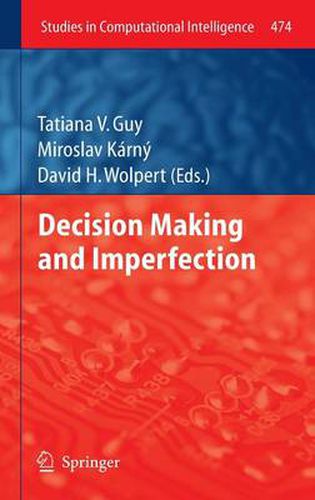Readings Newsletter
Become a Readings Member to make your shopping experience even easier.
Sign in or sign up for free!
You’re not far away from qualifying for FREE standard shipping within Australia
You’ve qualified for FREE standard shipping within Australia
The cart is loading…






This title is printed to order. This book may have been self-published. If so, we cannot guarantee the quality of the content. In the main most books will have gone through the editing process however some may not. We therefore suggest that you be aware of this before ordering this book. If in doubt check either the author or publisher’s details as we are unable to accept any returns unless they are faulty. Please contact us if you have any questions.
Decision making (DM) is ubiquitous in both natural and artificial systems. The decisions made often differ from those recommended by the axiomatically well-grounded normative Bayesian decision theory, in a large part due to limited cognitive and computational resources of decision makers (either artificial units or humans). This state of a airs is often described by saying that decision makers are imperfect and exhibit bounded rationality. The neglected influence of emotional state and personality traits is an additional reason why normative theory fails to model human DM process.
The book is a joint effort of the top researchers from different disciplines to identify sources of imperfection and ways how to decrease discrepancies between the prescriptive theory and real-life DM. The contributions consider:
*
how a crowd of imperfect decision makers outperforms experts’ decisions;
*
how to decrease decision makers’ imperfection by reducing knowledge available;
*
how to decrease imperfection via automated elicitation of DM preferences;
*
a human’s limited willingness to master the available decision-support tools as an additional source of imperfection;
*
how the decision maker’s emotional state influences the rationality; a DM support of edutainment robot based on its system of values and respecting emotions.
The book will appeal to anyone interested in the challenging topic of DM theory and its applications.
$9.00 standard shipping within Australia
FREE standard shipping within Australia for orders over $100.00
Express & International shipping calculated at checkout
This title is printed to order. This book may have been self-published. If so, we cannot guarantee the quality of the content. In the main most books will have gone through the editing process however some may not. We therefore suggest that you be aware of this before ordering this book. If in doubt check either the author or publisher’s details as we are unable to accept any returns unless they are faulty. Please contact us if you have any questions.
Decision making (DM) is ubiquitous in both natural and artificial systems. The decisions made often differ from those recommended by the axiomatically well-grounded normative Bayesian decision theory, in a large part due to limited cognitive and computational resources of decision makers (either artificial units or humans). This state of a airs is often described by saying that decision makers are imperfect and exhibit bounded rationality. The neglected influence of emotional state and personality traits is an additional reason why normative theory fails to model human DM process.
The book is a joint effort of the top researchers from different disciplines to identify sources of imperfection and ways how to decrease discrepancies between the prescriptive theory and real-life DM. The contributions consider:
*
how a crowd of imperfect decision makers outperforms experts’ decisions;
*
how to decrease decision makers’ imperfection by reducing knowledge available;
*
how to decrease imperfection via automated elicitation of DM preferences;
*
a human’s limited willingness to master the available decision-support tools as an additional source of imperfection;
*
how the decision maker’s emotional state influences the rationality; a DM support of edutainment robot based on its system of values and respecting emotions.
The book will appeal to anyone interested in the challenging topic of DM theory and its applications.